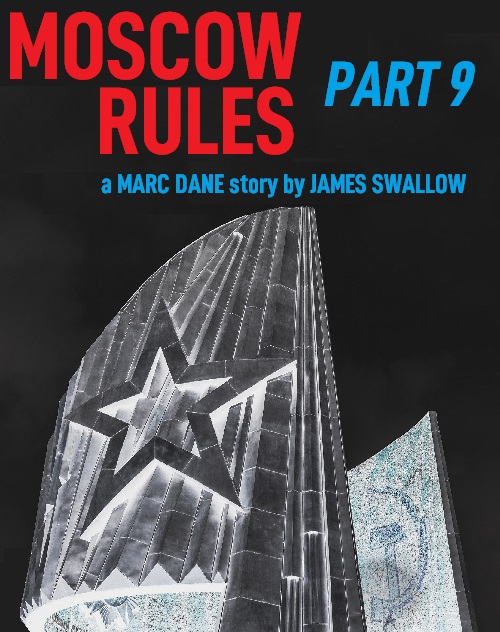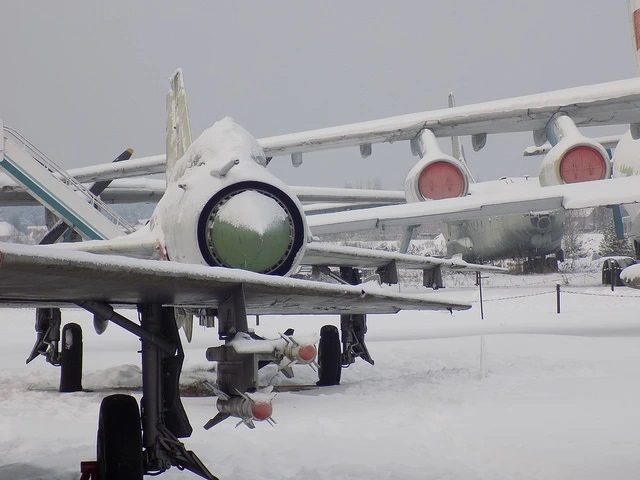We’re entering the final week now, as today’s blog features the penultimate chapter of my brand-new Marc Dane story MOSCOW RULES!

On a mission to fulfil a request for his employer on the streets of Moscow, Marc Dane finds himself dragged into a deadly scavenger hunt for a prize that could cause chaos in the wrong hands…
In Part 8, as Marc moves ever closer to the hiding place of Sergei Morozov’s blackmail ledger, he knows the net is tightening around him as Russia’s FSB and the ruthless Aleph mercenaries are hot on his trail…
Read on for Part 9 of MOSCOW RULES; the final part of the novella will be released on Friday, but if you’d like to read it before then, sign up to the James Swallow Reader’s Club at this link or type your email address in the box at the bottom of this page.
MOSCOW RULE part 9 – PICK THE TIME AND PLACE FOR ACTION
With the museum shut down and Russian agents combing the exhibits, it was a matter of when and not if they found the hiding place of Morozov’s ledger.
The KGB spymaster had secreted it inside one of the dozens of aircraft fuselages out in the cold daylight across the quadrangle, and Marc didn’t doubt that the Russians would take every last one of those old hulks to pieces, down to the rivets, if it meant finding the file.
But he had the one detail they did not; he knew where to look.

Marc moved fast and low, out from under the wing of a derelict transport and across an open path. He took care to stick to the edges where the frozen earth met the asphalt of the walkways, well aware that footprints across the fresh snowfall would betray his passing. He spotted two men in heavy coats a few hundred meters away, in the shadows cast by the fuselage of a huge bomber, as they probed the early morning gloom with handheld flashlights. Marc kept his distance, making his way toward his target as the wind picked up.
The last hint in Sergei Morozov’s deadly scavenger hunt was the tin toy souvenir from the museum gift shop, but it had only been one component of the clue. On discovering it, Marc had discarded the box it came in – but not before memorizing the propaganda art on the lid. The gaudy illustration showed a bold Soviet-era pilot and a sleek supersonic aircraft blazing a path to the future – an aircraft that only existed here in Monino, a machine of which only one had ever been built. Marc silently thanked his younger self for growing up obsessed with weird jet planes, as anyone else might not have made the vital connection.
As he moved between the exhibits, their wings creaking in the stiff breeze, he ticked them off a list in his thoughts as he searched for his quarry. Unlike most air forces of the world, the Warsaw Pact military machine had rarely cared to hang evocative or aggressive titles on their planes, preferring to stick to simple numerical manufacturing codes. But NATO forces had their own bestiary of common ‘reporting’ terms for Russian hardware, arranged by letter for ease of recall – so helicopters had names like Hind, Helix or Hokum; fighters were Flankers, Fitters, Floggers; and bombers were Bears, Backfires and Blackjacks.
Among them, the Myasishchev M-50 Bounder sat alone on the snow, nearly sixty meters of slim cylindrical fuselage pointing up at a shallow angle into the dull skies above. High delta wings mounted with nacelles for powerful turbojet engines groaned in the wintry gusts, and the whole assemblage seemed ready to blast off into the clouds. A creation from the halcyon years of the Jet Age, the prototype was a supersonic strategic bomber designed to range across the polar cap with a war-load of cruise missiles. Built to be fast and aggressive, the martial dream of the M-50 was to create a platform that could send nuclear fire to any point within the continental United States, at speeds beyond the capability of any USAF interceptors to respond. But the jet had never fulfilled its potential, instead becoming little more than a ghost threat that had terrified Western generals into believing the Soviet bomber fleets vastly overmatched theirs.
Marc could see why Sergei Morozov had chosen the M-50 as the hiding place for his secrets – it, like him, had been a weapon in a war of phantoms, the physical manifestation of a bellicose lie sold to Russia’s enemies.
He slipped under the span of the delta wings and found a crew hatch, pulling at the ice-rimed release switch until it finally gave. Metal creaked loudly, and Marc winced, fearful that the sound would carry. He scrambled inside, the freezing cold metal of the fuselage stinging through the material of his clothes, and yanked the hatch shut behind him.
The narrow interior of the old bomber was claustrophobic and colder than a meat-locker. Marc crouch-walked forward to avoid cracking his head on the panels above as he edged forward. Blade-sharp pieces of torn steel caught on his sleeves in the places where instruments had been removed from the aircraft, and bunches of wires with crumbling insulation dangled from empty sockets. He moved with care, placing each step and testing his footing before advancing.
The fuselage narrowed to a tight tandem cockpit, and Marc sat in the bare metal frame of the pilot’s position, risking a look out through thick panes of the canopy. The old glass was grubby and covered in a layer of frost, but he could see the men in heavy coats nearby as black blobs sliding over the white snow. They’d given up their search of a retired Tu-95 Bear and had moved on to its neighbour. The M-50 would be next.
The wind was getting stronger, blowing curls of white flakes up and around the old jet, and the breeze moaned through holes in the metal frame, the aircraft rocking slightly as if in faint memory of its final flight. Marc exhaled a gust of breath and let his gaze fall over the old bomber’s control panel, across dials and switches labelled in Cyrillic. His mind wandered for a moment. He imagined what it would have been like to be strapped into this thing atop a load of atomic hellfire, hurtling across the roof of the world at multiple Mach speeds, and he put one hand on the flight yoke, the other automatically dropping to rest on something beside the seat.
He looked down. There was a small log book cubby beside the pilot’s station, and in it was something wrapped in a heavy waterproof cloth. Marc’s pulse rate jumped.
Is that it?
The object was an ordinary ring-binder, the kind any college student would be familiar with, and clipped inside were countless plastic sleeves, each containing sheets of thin, almost translucent paper. Marc removed one at random and held it up to the weak light through the canopy, his eyes narrowing.
The sheet was filled from top to bottom with dense lines of numbers and odd symbols – not English or Russian characters, but something he didn’t recognize – and on the binder’s spine there was a single word. Scheta.
“Accounts,” Marc translated aloud. “Like a ledger.”
Any sense of victory at finding the prize at the end of Morozov’s treasure hunt was dampened by the reality of the file’s contents. Another bloody puzzle, Marc thought, the whole damn thing is written in code!
But then, he reflected, what else had he expected? Glossy photos of the sitting Russian president in compromising positions, account details for all the Kremlin’s black banks, or launch codes for their ICBMs? Of course it would be encoded. Morozov’s thoroughness wouldn’t have allowed for anything else.
He returned the sheet to its sleeve, and considered the other pages. At first glance, the ledger appeared to be what it promised. Even after decoding, reading, and translating, parsing the contents would take months of dedicated analysis. There were easily hundreds of thousands of words of material there, and with them the promise of decades of secrets. Or maybe it’s just a scrapbook of Morozov’s family recipes. Carrot soup instead of komopromat.
Knives of cold air invaded the cockpit as the morning chill deepened, and Marc peered outside again. The black-coated men were nowhere to be seen. He felt a tremor work its way up from the middle of the aircraft, and heard the grinding creak of the access hatch coming open again.
Trapped! He was out of the pilot’s seat in an instant, tucking the binder awkwardly under his hoodie. Spears of light were coming in through the hatch and Marc heard voices crackling over walkie-talkies. They’d be inside in moments, and then Marc would most likely become a permanent addition to this particular museum piece.
He cast around. In action, the M-50’s flight crew would have strapped into rocket-powered ejector seats that could blast them up and out of the fuselage in the event of an emergency, but all of those mechanisms had been stripped decades ago, after the prototype bomber was bequeathed to the museum – not that punching out of a sixty year-old static aircraft would have been anything less than a death sentence. But the release panels above the seats were still in place.
Marc stood up, pressing his shoulders into the curved steel sheet and shoved it with all the force he could muster. Metal and rust cracked and gave, splitting along pre-cut lines of fracture. He tried again, and this time the panel gave out, splintering as it slipped off the fuselage and away into the snow.
The jet rocked as the black-coated FSB agents climbed inside, but Marc was already scrambling out into the cold day, fumbling for purchase back down the incline of the M-50’s canted neck. He hauled himself toward the rear of the aircraft, before sliding out over one of the snow-covered wings. He let gravity take him, the icy wind whipping at his face as he sprawled over the tarnished metal in a half-controlled fall toward the ground.
At the last moment, Marc kicked out and arrested his forward motion before he was thrown off, jamming his bootheel into a raised strake above the bomber’s jet nacelle. He rolled to his knees and into a crouch. Another delta-winged jet was parked close by, near enough that he’d be able to leap the short gap between the two aircraft. Then, he could sprint into the lines of mothballed helicopters, and –
A salvo of gunshots ripped through his train of thought, bullets punching holes through the thin wings of the bomber, close enough that flecks of hot shrapnel stung his legs.
“Shit!” Marc stumbled and over-balanced, slipping back toward the three-meter drop at the edge of the wing. He grabbed hold of the engine strake and held on for dear life.
A second wave of shots didn’t follow, but a voice did. “You found it, yes?” Melor Rykov called out from the ground below. “Come now, Mr. Dane. No more games. I do not wish for the gentlemen accompanying me to damage this rare aircraft any more than they already have.”
Marc weighed his options, quickly coming to the grim understanding that he didn’t actually have any. “I’m unarmed,” he called back. “Don’t shoot, all right?”
“Stand up,” said Rykov. “Show it to me.”
Taking his time about it, Marc rose to his feet until he was standing with his arms raised, balancing unsteadily on the edge of the M-50’s triangular wing as the wind whipped at his legs. Below him on the snow, he saw Rykov and his pugnacious second-in-command Gurik, and a couple more FSB types. But what he hadn’t expected were the others – five stocky figures in Aleph jackets and tactical rigs, among them the two operatives from the confrontation at the safehouse. All the Aleph mercenaries had submachine guns, and the weapons were pointed toward Marc, not the Russians.
Rykov noted the flash of confusion on his face and showed a toothy smile. “An arrangement has been made. We decided to pool our resources,” said the agent, by way of explanation. “Your attempt to create conflict between our parties had an unfortunate side-effect.” He paused. “Unfortunate for you, that is.”
“Where is book?” The Aleph operative called Yevgeny spat the question, the same one he’d asked the first time they met.
“You’re going to split it fifty-fifty, is that how it goes?” Marc found Yevgeny’s partner and shot him a look. “Is your employer going to swallow that, Avgar?”
The other mercenary grimaced at the thought that Marc knew his name, shifting uncomfortably. “Just kill him and take it.” The other Aleph men raised their guns.
“Be calm.” Rykov’s smile was fading. He wanted to be in charge here, and it was clear the temporary alliance in play was a tenuous one. “The ledger, Mr. Dane. Don’t be a fool. You have lost. Hand it over, and I promise you will live.”
With a weary sigh, Marc slowly pulled the ring-binder from beneath his hoodie. “You let me find this, didn’t you? That’s why I wasn’t arrested getting here.”
Rykov nodded. “We would have uncovered it eventually. But you earned the right to recover Sergei’s prize…”
“But not to keep it,” rumbled Gurik. “It belongs to us.”
“Right.” Marc was silent for a moment, then he let the folder fall open, the plastic pages inside rippling in the wind. “Let me ask you something: do you know what’s in here? I mean, really know?”
Rykov’s expression was stony and unreadable, but Gurik didn’t have the same self-control, and doubt flashed over his features.
“You don’t, do you?” Marc went on, glancing toward the Aleph operatives. “What about you lot? Any clue what you’re actually fighting over?”
Yevgeny grimaced. “There are rumours. It is valuable.” Then the mercenary straightened. “Give it, now.”
“To who?” Marc looked between Yevgeny and Rykov, offering up the folder with one hand. “You? Or you?
“We will secure the ledger,” Avgar said firmly, and for the first time the guns held by the Aleph mercenaries dropped a few degrees. Suddenly the men on the ground were looking at each other and not at Marc.
“That was not our agreement,” Rykov retorted.
“Plans change,” said Yevgeny.
Marc looked down at the open pages of the file in his hand, at the dense lines of impenetrable, nonsensical code-writing, and a choice crystallized in his thoughts. “Sod it,” he said, “you twats can sort this shit out yourselves.”
He flicked his hand up, snapping open the binder’s ring clips so the pages were suddenly released. With the wind pushing at him, the papers were abruptly caught in the updraft over the old bomber’s wings. They blew away in a fluttering swarm, out over the quadrangle.
Gurik shouted in alarm and ran after the tumbling and wheeling papers, and the group broke into confusion, shouting at one another, uncertain how to react.
But Marc was already moving by the time Avgar decided to start shooting. He pitched himself off the M-50’s high wing at a full-tilt run, landing in a thick drift of snow gathered around the rear of the static jet.
Breath blew out of his lungs and he tasted blood in his mouth, pain shocked through his joints like jolts of fire – but he couldn’t slow down, couldn’t chance that the men with guns would be slow to come after him.
Gasping, growling with the effort, Marc forced himself up and started to run. Gunfire cracked through the cold air behind him, and he couldn’t be sure if they were shooting at him or one another – until a ricochet spanked off the tailplane of a snow-covered MiG as he stumbled past it. He veered away, trying to put more metal between him and his pursuers, gambling that they would be more intent on finding those windblown pages than coming after him.
What the hell have you done? The admonishing voice in his thoughts sounded like Lucy’s. He heard her chastising him over the thudding pulse of his blood in his ears. All the running and the shooting and whatever else, and you threw away the goddamned ledger?
“Nothing matters if I’m dead,” he puffed, responding to the icy air. Marc skidded over a rise and past a line of trees, hearing angry voices coming from different directions. They were close, and he was worn out from the cold and the fatigue, his adrenaline crashing with every step.
He loped toward the gatehouse at the museum’s entrance, dimly aware that the barrier was now raised. A black car came toward him, slowing as it approached, slewing around. Marc had nowhere to go, the vehicle directly between him and his only escape route.
The driver’s side window dropped and an elderly woman leaned out from behind the dashboard, her kind eyes wide, her elegant features creasing around a smile.
“Get in, boy,” said Galina Morozova, her breath white in the air. “You will catch your death out there.”


